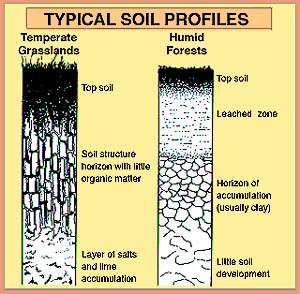Soil Formation
Soils vary greatly, depending on climate, rainfall, and other factors. Any soil has three basic components: the rock particles and dissolved minerals from parent rock; organic material from previously living organisms; communities of living plants and animals, particularly micro-organisms. It follows that the nature and characteristics of soils will differ considerably, based on the chemical composition of the parent rock and other factors like climate and rainfall. A soil draws most of its minerals from the underlying parent rock. Soil formed from limestone is rich in minerals important to plant growth, while granite-based soils are poor in the minerals plants need. It also makes a difference whether soil develops in, for example, hot tropical, dry temperate, or wet temperate climates. Both the physical processes and the biological communities within the soil would vary in each case.
 Soil formation begins when the "parent rock" is dissolved and/or pulverized by the effects of water, temperature changes, the effects of the atmosphere, biological agents, etc., into very fine particles. Water is critical in the process. Rain dissolves the minerals and makes them usable by plants and micro-organisms. Various kinds of micro-organisms also play a part in decomposing rock and releasing chemicals for use. Micro-organisms also assist in the decomposition of plants and animals that have died, releasing their minerals and energy for further use. Worms, insects, burrowing animals like moles shape and blend the soil by their activities. Charles Darwin noted that earthworms, more than any other form of life, including humans, were responsible for enormous alterations of the earth's surface. But almost all of the biological activity in the earth's crust is very close to the surface--2 to 5 cm. Only a few forms of life penetrate below that level, and most of those only to about 20 cm.
Soil formation begins when the "parent rock" is dissolved and/or pulverized by the effects of water, temperature changes, the effects of the atmosphere, biological agents, etc., into very fine particles. Water is critical in the process. Rain dissolves the minerals and makes them usable by plants and micro-organisms. Various kinds of micro-organisms also play a part in decomposing rock and releasing chemicals for use. Micro-organisms also assist in the decomposition of plants and animals that have died, releasing their minerals and energy for further use. Worms, insects, burrowing animals like moles shape and blend the soil by their activities. Charles Darwin noted that earthworms, more than any other form of life, including humans, were responsible for enormous alterations of the earth's surface. But almost all of the biological activity in the earth's crust is very close to the surface--2 to 5 cm. Only a few forms of life penetrate below that level, and most of those only to about 20 cm.
Soil formation is an on-going process, but it occurs very slowly. Because the natural processes, energy exchanges, and biological communities can all be changed drastically by interruptions of any of these processes, it is obvious that soils are fragile and exhaustible. For example, removing plant cover by burning or plowing may make the soil subject to erosion. The same changes will affect the biological communities in the soil.
Generally speaking, the amount of rainfall is crucial in whether the minerals released from the parent rock are available and usable by plants or not--and thus whether the soil will be fertile enough to support agriculture. Too much rain will leech away the minerals below the level roots can reach; hence, tropical forests grow on suprisingly poor soils, and depend for their continuance on the fragile but highly active biological communities that constantly recycle nutrients and energy from decaying life forms in the topmost layer of the soil.
 Soil formation begins when the "parent rock" is dissolved and/or pulverized by the effects of water, temperature changes, the effects of the atmosphere, biological agents, etc., into very fine particles. Water is critical in the process. Rain dissolves the minerals and makes them usable by plants and micro-organisms. Various kinds of micro-organisms also play a part in decomposing rock and releasing chemicals for use. Micro-organisms also assist in the decomposition of plants and animals that have died, releasing their minerals and energy for further use. Worms, insects, burrowing animals like moles shape and blend the soil by their activities. Charles Darwin noted that earthworms, more than any other form of life, including humans, were responsible for enormous alterations of the earth's surface. But almost all of the biological activity in the earth's crust is very close to the surface--2 to 5 cm. Only a few forms of life penetrate below that level, and most of those only to about 20 cm.
Soil formation begins when the "parent rock" is dissolved and/or pulverized by the effects of water, temperature changes, the effects of the atmosphere, biological agents, etc., into very fine particles. Water is critical in the process. Rain dissolves the minerals and makes them usable by plants and micro-organisms. Various kinds of micro-organisms also play a part in decomposing rock and releasing chemicals for use. Micro-organisms also assist in the decomposition of plants and animals that have died, releasing their minerals and energy for further use. Worms, insects, burrowing animals like moles shape and blend the soil by their activities. Charles Darwin noted that earthworms, more than any other form of life, including humans, were responsible for enormous alterations of the earth's surface. But almost all of the biological activity in the earth's crust is very close to the surface--2 to 5 cm. Only a few forms of life penetrate below that level, and most of those only to about 20 cm.